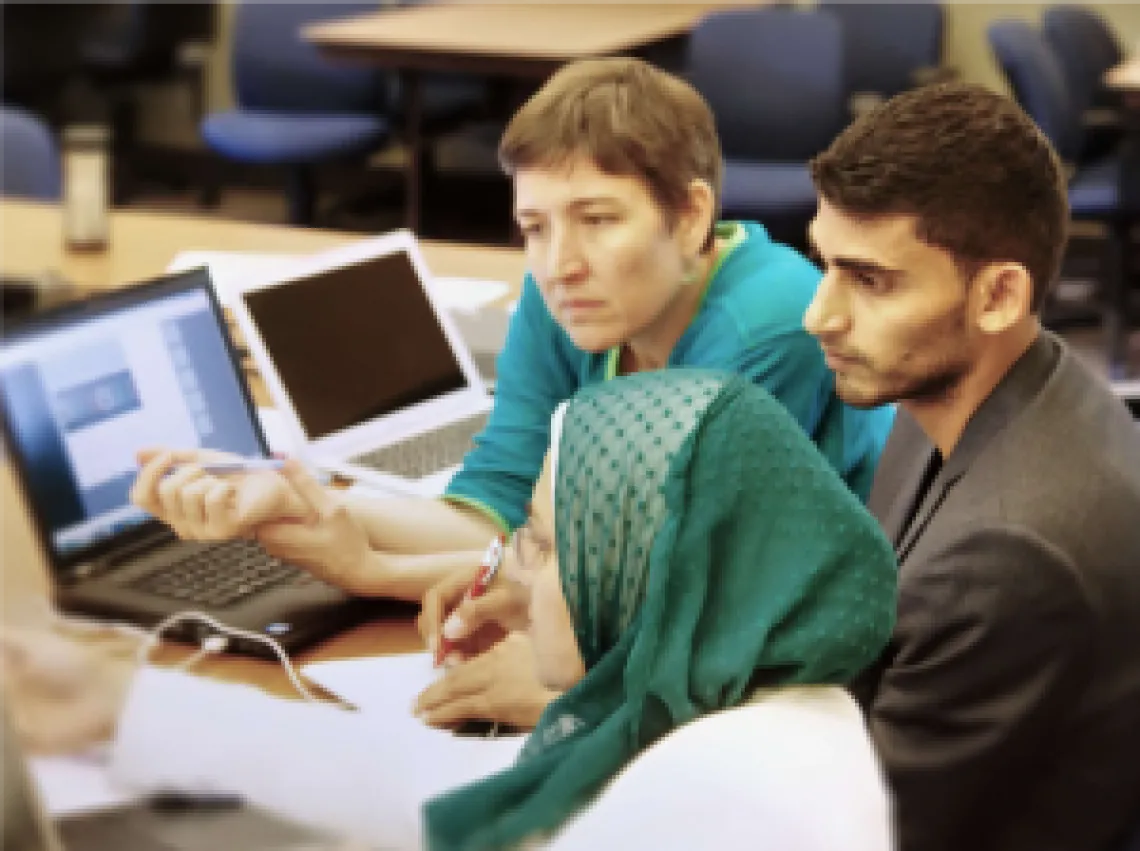Refugee Education: Classroom, Campus, and Community

By Elizabeth Labiner
Julie Kasper’s work as an English language teacher has taken her around the world, and she’s happiest when her classroom environment reflects that global perspective. She has a wealth of experience teaching both children and adults, abroad and in the United States; she taught in Japan, in New York in public elementary and high schools as well as in the New York City Queens Public Library system, and in Tucson both in high school and a community center of her own design. Catalina High School here in Tucson offered Kasper her first opportunity to work with refugee students -- work that would hone her focus for years to come. “Working in Arizona offers many avenues for teaching English, but I was looking for diversity in my teaching space. I really like to be in a multilingual classroom. Language is about culture and community, but it’s also determinative of access to opportunities,” Kasper says. She loves bridging the classroom and community, emphasizing project-based learning that forges connections for English language learners.
In 2014, Kasper left the K-12 system in order to focus on community education and work to address the myriad systemic problems that disadvantage refugee students. After a great deal of discussion with refugee students, their parents, civic leaders, and educational leaders, she realized that a community center for refugees could provide sorely-needed support. Kasper set up a center in downtown Tucson that offered after-school and weekend tutoring for refugee students, programs for refugee parents looking to better support their children’s education, as well as professional development for educators.
Now, Kasper is a graduate student in the Educational Leadership program in the UA College of Education. The Educational Leadership program focuses on expanding the boundaries of the educational leadership and policy field with an explicit focus on equity, culture, and diversity. Kasper explains, “I started thinking about graduate school as a way to increase my knowledge and my voice, and improve my ability to advocate for the communities that I work with and for.” The goal of maximizing her authority and power as an advocate fuels Kasper’s scholarship, but though she’s busy with coursework, she hasn’t stepped away from her community work or her focus on refugees. Much of her current work is with educators of refugees, examining how teachers can serve communities and lead transformations in pedagogy and policy as they educate minority and marginalized groups.
Kasper’s current project aims to engage with and support a typically underserved portion of the refugee population: young adults working to obtain their GED: “It’s a very small grassroots initiative that I just launched, and it addresses a very specific gap in the support given to refugee communities.” There are GED programs, Kasper explains, but they tend to have specific structures that prove logistically and academically inaccessible to young adult refugees. The barriers that make traditional GED classes a struggle for refugee scholars in the 18-26 age range can be addressed by offering more flexibility, a combination of academic and English language study, and mentorship.
This mentorship aspect of Kasper’s support program is perhaps the most important, and is an opportunity for UA graduate students to get involved. Her program pairs graduate students with refugee scholars for academic and moral support, and -- crucially -- companionship. “The experience of working toward the GED can be incredibly isolating, and it can make a big difference to just have someone to sit next to you, even if you’re both simply working in silence,” Kasper says. The graduate student mentor can be doing their own work while the refugee scholar studies alongside them; the pair makes their own flexible schedule to meet and work together, learning from each other and providing mutual support. Kasper hopes that in addition to the academic and psychological benefits of the partnerships, the project will foster a sense of belonging among participants and in the wider community on campus and in Tucson.
This project is low-impact in terms of the workload placed on the mentors, but has enormous positive impact on the students’ motivation, mental and emotional health, and hope for their future. This project is small for the moment, but our graduate student community can help it grow. Graduate students who are interested in mentoring refugee scholars should contact Julie Kasper at juliekasper@email.arizona.edu to learn more.

